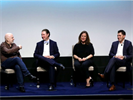Arun Sudhaman 12 Nov 2013 // 5:08PM GMT
MIAMI—The conventional idea of a brand is dead, media theorist and author Douglas Rushkoff told Global PR Summit attendees today.
Rushkoff, who was speaking at a Weber Shandwick session called ‘The Tao of Now’, said that brands could no longer function as a cover for a company.
Instead, he said, brands need to make themselves more immediately relevant. "That doesn’t mean 'flash in the pan' publicity stuff. You have to keep arming your ardent supporters with the ammunition they need to champion you."
In particular, said Rushkoff, companies had to become more comfortable "not taking credit for things" and more focused on "enabling things to happen."
Rushkoff made the comments in relation to his book 'Present Shock: When Everything Happens Now', which examines the technological shift to a more continuous, 'always-on' world.
He pointed out that these changes pose significant challenges for the PR industry, given its Bernaysian legacy.
"This is an industry fathered by a man — Ed Bernays — that believed that people were too stupid to run their own lives," said Rushkoff. "That’s an interesting legacy to come from."
As people move towards more peer-to-peer connections online, said Rushkoff, PR people need to let go of the idea of storytelling.
"I think we can move from storytelling industry to one that’s much more like game design in which you are creating the landscape in which people can communicate with each other," explained Rushkoff. "And if you do that, you’ll move from the old style of broadcasting messages to some audience."
The traditional narrative, said Rushkoff, no longer applies. In addition, companies should no longer be looking to present their competitive advantage in terms of results.
"Your competitive advantage from a social/people standpoint, that stays," he said. "When you’re trying to have a competitive advantage in a medical field, it's who has created the best culture, the best community. They don’t depend on the last medical efficacy report.|
Rushkoff's address challenged other traditional modes of PR thinking. He believes, for example, that corporations "cannot live" in today's realtime era. "You can’t communicate a company, the people within it can communicate," he said. "Only we’re really afraid of that."
To do that, he said, PR has to move from a communications focus to an operational one. "You guys know better than the people in the company how the public is relating to the company, to their products, actions, the things they do."
Accordingly, Rushkoff urged PR people convert the comms strategy from a stories to experiences, using video game design as an example.
"A good video game is not about winning and ending, it’s about keeping the play alive as long as possible," said Rushkoff. And that’s more consonant with the values of the world that is no longer obsessed with conquest but is beginning to be concerned about sustainability."
Rushkoff described big data, meanwhile, as a "fantasy of time travel."
"You use data from the past to predict the future before people get there. No matter how good your predictive model is you are driving through the rearview mirror."


































.jpg)






.tmb-135x100.png)










